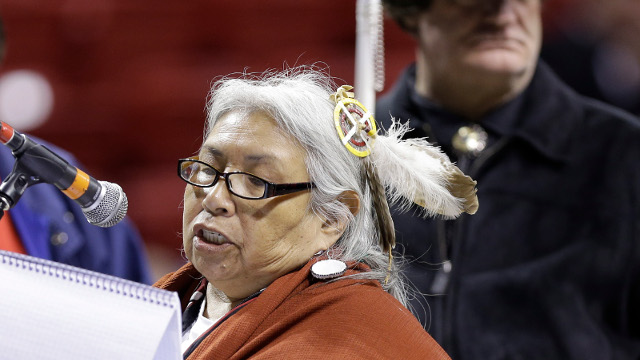
Faith Spotted Eagle, a Yankton Sioux, speaks in opposition to the Keystone XL pipeline, with Carl Hudson, Chief of the Southern Cherokee, right, awaits his turn to speak, during the U.S. State Department’s sole public hearing in Grand Island, Neb., Thursday, April 18, 2013, to allow citizens to make their views known on the $7.6 billion Canada-to-Texas Keystone XL pipeline. (AP Photo/Nati Harnik)
The only reason the northern leg of the Keystone XL pipeline wasn’t approved years ago is that activists, deeming it a vital proxy in the larger battle to keep the dirtiest fossil fuels in the ground, have applied relentless pressure on the Obama administration. But in the Great Plains, Native Americans have little confidence that the project can be stopped by traditional political activism.
On Sunday, Rob Hotakainen reported for McClatchy that some tribal leaders are preparing to mount a “last stand” against the pipeline if the White House approves its construction.
Faith Spotted Eagle figures that building a crude oil pipeline from Canada to the U.S. Gulf Coast would bring little to Indian Country besides more crime and dirty water, but she doubts that Native Americans will ever get the U.S. government to block the $7 billion project.
“There is no way for Native people to say no – there never has been,” said Spotted Eagle, 65, a Yankton Sioux tribal elder from Lake Andes, S.D. “Our history has caused us not to be optimistic. . . . When you have capitalism, you have to have an underclass – and we’re the underclass.”
Opponents may be down after a State Department study found that the proposed Keystone XL pipeline would not contribute to global warming. But they haven’t abandoned their goal of killing what some call “the black snake.”
In South Dakota, home to some of the nation’s poorest American Indians, tribes are busy preparing for nonviolent battle with “resistance training” aimed at TransCanada, the company that wants to develop the 1,700-mile pipeline.
While organizers said they want to keep their strategy a secret, they’re considering everything from vigils to civil disobedience to blockades to thwart the moving of construction equipment and the delivery of materials.
“We’re going to do everything we possibly can,” said Greg Grey Cloud of the Rosebud Sioux Tribe, who attended a two-day conference and training session in Rapid City last week sponsored by the Oglala Sioux Tribe called “Help Save Mother Earth from the Keystone Pipeline.” He said tribes are considering setting up encampments to follow the construction, but he stressed that any actions would be peaceful. “We’re not going to damage anything or riot or anything like that,” he said.
In some of the poorest communities in the country, others are looking at the project as a source of vital economic development.

